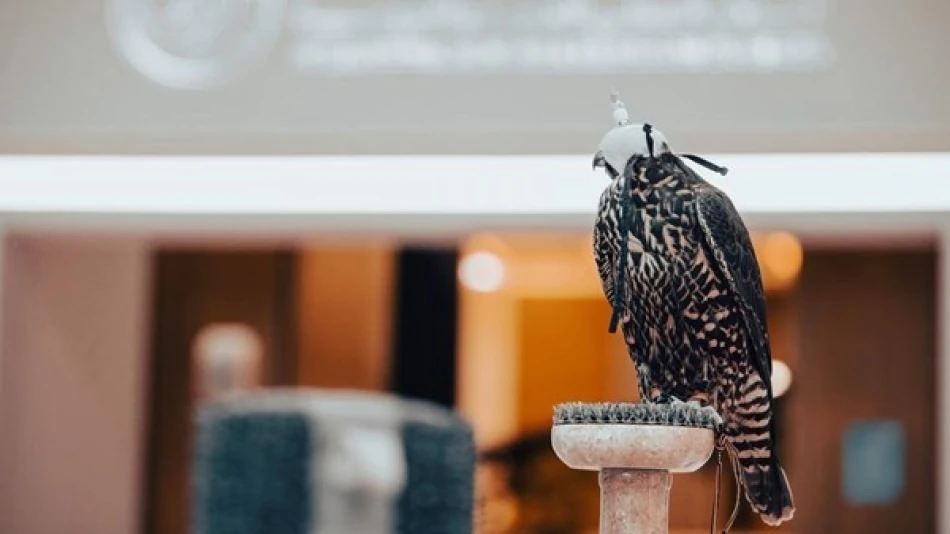
Soaring Success: Abu Dhabi International Hunting and Equestrian Exhibition Celebrates Trailblazing Legacy
UAE's Falconry Heritage Soars: How Sheikh Zayed Built a Global Conservation Legacy
The Abu Dhabi International Hunting and Equestrian Exhibition has evolved into a world-class platform for sustainable hunting and conservation over two decades, rooted in the visionary leadership of the late Sheikh Zayed bin Sultan Al Nahyan. Known as the "First Falconer," Sheikh Zayed transformed traditional Emirati falconry from a desert pastime into a UNESCO-recognized cultural heritage while pioneering wildlife conservation efforts that continue to influence global environmental policy today.
From Desert Tradition to Global Movement
Sheikh Zayed's approach to falconry was revolutionary for its time. Rather than viewing the ancient hunting practice as merely recreational, he positioned it as a bridge between cultural preservation and environmental stewardship. His 1976 book "The Sport of Hunting with Falcons" became a definitive reference work, combining traditional knowledge with scientific conservation principles—a approach that predated modern sustainable tourism concepts by decades.
The turning point came with the 1976 International Friendship Conference for Falconry in Abu Dhabi, which Sheikh Zayed personally initiated. This gathering marked the first time falconers from the Arabian Peninsula, North America, Europe, and the Far East collaborated on conservation strategies. The conference laid the groundwork for what would eventually become falconry's inclusion in UNESCO's Intangible Cultural Heritage list—a recognition that provides international protection for traditional practices.
Building Conservation Infrastructure
Sheikh Zayed's conservation legacy extends far beyond cultural preservation. He established the Abu Dhabi Falcon Hospital, created the Emirates Center for Wildlife Propagation in Morocco in 1995, and supported the International Fund for Houbara Conservation in Pakistan. These institutions represent a comprehensive approach to species protection that combines breeding programs, habitat preservation, and international cooperation.
Sustainable Hunting as Conservation Tool
The UAE's model demonstrates how traditional hunting practices can serve modern conservation goals—a concept now widely adopted across Africa and Asia. By regulating hunting seasons, establishing protected areas, and funding breeding programs, Sheikh Zayed created a framework where hunters become stakeholders in wildlife preservation rather than threats to it.
This approach has proven particularly effective with houbara bustards, whose populations have stabilized in regions where UAE-funded conservation programs operate, contrasting sharply with declining numbers in areas without such initiatives.
Modern Impact and Global Influence
The establishment of the Emirates Falconers' Club in 2001 and the launch of the Abu Dhabi International Hunting and Equestrian Exhibition in 2003 institutionalized Sheikh Zayed's vision. Today, the exhibition attracts over 100,000 visitors annually and serves as a platform for conservation technology, sustainable hunting equipment, and international wildlife protection agreements.
The recent 22nd edition of the exhibition coincided with a special issue of "Al Saqr" magazine, which featured rare archival photographs and documentation of Sheikh Zayed's conservation work. This historical record provides valuable insights into early environmental leadership in the Gulf region, predating the current global focus on sustainability by several decades.
Economic and Diplomatic Dimensions
Beyond conservation, the UAE's falconry heritage has become a significant economic asset. The country's falcon hospitals, breeding centers, and training facilities generate substantial revenue while positioning the UAE as a leader in wildlife tourism. This economic model has been studied and adapted by other Gulf states seeking to diversify their economies beyond oil.
Diplomatically, falconry serves as a cultural bridge with Central Asian countries, Pakistan, and Morocco—regions where the UAE maintains strong political and economic ties. Conservation partnerships often precede broader bilateral agreements, demonstrating how environmental cooperation can facilitate diplomatic relations.
Legacy in Contemporary Conservation
Sheikh Zayed's integration of traditional practices with modern conservation science offers valuable lessons for contemporary environmental challenges. His emphasis on community engagement, international cooperation, and economic sustainability provides a blueprint for conservation efforts in developing regions where local communities depend on natural resources for their livelihoods.
The UAE's continued investment in falcon conservation, including genetic research and habitat restoration projects across multiple continents, demonstrates how small nations can achieve outsized influence in global environmental affairs through focused expertise and sustained commitment. As climate change and habitat loss intensify pressure on wildlife populations worldwide, the UAE's model of conservation through cultural preservation offers a practical alternative to purely regulatory approaches.
Most Viewed News

 Layla Al Mansoori
Layla Al Mansoori






